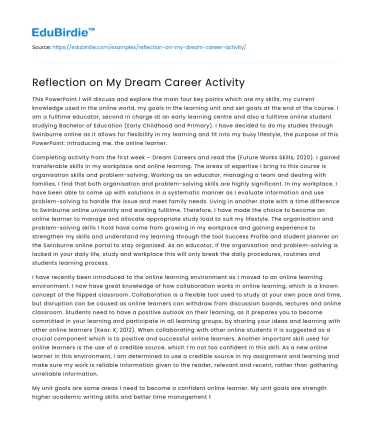Introduction
In an ever-evolving world, the concept of a "dream career" is both aspirational and fluid, often shaped by societal trends, personal interests, and individual experiences. Engaging in activities that allow for reflection on one's dream career can provide clarity and direction in the complex landscape of occupational choices. This essay seeks to explore the significance of reflecting on one's dream career, examining the impact of such reflections on personal growth and career planning. By analyzing various aspects of the activity, including self-assessment, goal setting, and external influences, this essay aims to illuminate the multifaceted nature of career planning. The insights gained from this process not only enhance one's understanding of personal aspirations but also facilitate informed decision-making in pursuing a fulfilling career.
The Role of Self-Assessment in Career Reflection
Self-assessment is a critical component of reflecting on a dream career, providing individuals with a deeper understanding of their strengths, weaknesses, interests, and values. The process of introspection allows individuals to identify their core competencies and align them with potential career paths. According to Holland's Theory of Career Choice, individuals are more likely to succeed and find satisfaction in careers that match their personality types (Nauta, 2010). Thus, self-assessment tools such as personality tests, skill inventories, and interest surveys play a vital role in the career reflection process.
Save your time!
We can take care of your essay
- Proper editing and formatting
- Free revision, title page, and bibliography
- Flexible prices and money-back guarantee
For instance, the Myers-Briggs Type Indicator (MBTI) is widely used to help individuals understand their personality preferences and how these preferences can influence career choices. By identifying one's MBTI type, individuals can explore career options that are compatible with their innate characteristics. Similarly, the Strong Interest Inventory provides insights into an individual's interests and suggests career paths that align with those interests (Savickas, 2011).
However, the self-assessment process is not without its challenges. Critics argue that such tools can sometimes pigeonhole individuals into specific career paths, limiting their exploration of diverse opportunities (Spokane, 1996). Moreover, individuals' interests and strengths can evolve over time, necessitating ongoing reflection and reassessment. Despite these challenges, self-assessment remains a valuable starting point for individuals seeking to align their career goals with their personal attributes.
Goal Setting and Its Impact on Career Planning
Once individuals have a clearer understanding of their personal attributes through self-assessment, the next logical step in career reflection is goal setting. Effective goal setting involves defining clear, achievable objectives that guide individuals toward their desired career outcomes. According to Locke and Latham's Goal Setting Theory, specific and challenging goals, coupled with appropriate feedback, can lead to higher performance (Locke & Latham, 2002).
Setting career goals requires individuals to consider both short-term and long-term objectives. Short-term goals may include acquiring specific skills, gaining relevant experience, or networking with industry professionals. Long-term goals, on the other hand, involve envisioning one's ultimate career destination and the steps necessary to reach it. For example, someone aspiring to become a medical researcher might set short-term goals of completing relevant coursework and internships, while their long-term goal would be to secure a research position at a renowned institution.
Goal setting, however, is not a linear process. It requires flexibility and adaptability, as individuals may encounter unforeseen challenges or opportunities along their career paths. The ability to reassess and adjust goals is essential for maintaining motivation and progress. Additionally, the influence of external factors, such as economic conditions or technological advancements, can impact the feasibility of certain career goals, necessitating continuous reflection and adaptation.
The Influence of External Factors on Career Choices
While self-assessment and goal setting are intrinsic elements of career reflection, external factors also play a significant role in shaping career choices. These factors include societal expectations, economic conditions, technological advancements, and cultural influences. Understanding the impact of these external factors is crucial for individuals to make informed career decisions.
Societal expectations often exert pressure on individuals to pursue certain careers deemed prestigious or lucrative. For instance, the emphasis on STEM (Science, Technology, Engineering, and Mathematics) careers in recent years has influenced many students to choose related fields, sometimes at the expense of their true interests (Brown, 2015). Economic conditions, such as job market trends and employment rates, also influence career choices, as individuals seek stable and secure employment opportunities.
Technological advancements have further transformed the career landscape, creating new opportunities and rendering some traditional jobs obsolete. The rise of automation and artificial intelligence, for example, has led to increased demand for skills in data analysis and machine learning, prompting individuals to adapt and upskill accordingly (Bessen, 2019).
Cultural influences, including family expectations and societal norms, can also impact career choices. In some cultures, certain professions are highly valued, while others are stigmatized. Navigating these cultural influences requires individuals to balance personal aspirations with external expectations, often leading to complex decision-making processes.
Conclusion
Reflecting on one's dream career is a dynamic and multifaceted process that involves self-assessment, goal setting, and consideration of external influences. By engaging in this process, individuals gain valuable insights into their personal attributes and aspirations, enabling them to make informed career decisions. While challenges such as evolving interests and external pressures may arise, the ability to adapt and remain open to new opportunities is essential for achieving long-term career satisfaction. Ultimately, the journey of career reflection is not just about reaching a predetermined destination but about embracing the ongoing process of growth and discovery in the pursuit of a fulfilling and meaningful career.
This essay provides a comprehensive reflection on the activity of contemplating a dream career, exploring its various dimensions and the factors influencing career decisions.






 Stuck on your essay?
Stuck on your essay?

